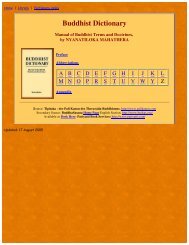The Three Basic Facts of Existence II: Suffering (Dukkha) - Buddhist ...
The Three Basic Facts of Existence II: Suffering (Dukkha) - Buddhist ...
The Three Basic Facts of Existence II: Suffering (Dukkha) - Buddhist ...
- No tags were found...
Create successful ePaper yourself
Turn your PDF publications into a flip-book with our unique Google optimized e-Paper software.
V<strong>II</strong>I. Craving and <strong>Dukkha</strong> Permeates All LifeLife is a self-supporting, self-developing process. In terms <strong>of</strong> this planet, scientific studies havetraced a three billion year history <strong>of</strong> slow development, from lowly beginnings, reaching up atlast to humankind. Man is unique in being the first <strong>of</strong> all creatures to theorise upon and finallycomprehend this.From the simplest, lowliest virus to such developed animal minds as apes, whales, andelephants, no creature is free <strong>of</strong> craving. Animals first <strong>of</strong> all desire food. All creatures must eat,and eat continually to support life. Even the very lowest creatures, such as amoeba,paramecium, and bacteria, must search for food. To find food they must adapt and specialise.An amoeba, a single-celled creature, hunts for and preys on creatures yet smaller than itself.It extends itself, forming pseudopods, reaching out, grasping, over-reaching and enfolding itsvictim.A paramecium has a different method. Smooth and streamlined, propelled by rhythmicallybeating cilia, it darts about sensing its prey, then pounces and swallows its meal through thegaping gullet in the contra <strong>of</strong> its back.Bacteria are more sedentary. <strong>The</strong>y do not hunt for prey, but rather feed on dead, orsometimes parasitize living, matter, plant or animal, breeding enormously when food isavailable, and lying dormant at other times. Yet another specialisation is the volvox. This smallcreature is composed <strong>of</strong> many cells. Some are specialised for swimming, some for seeing anddirecting operations, yet others for reproduction. Each one <strong>of</strong> these cells is capable <strong>of</strong> living aseparate animal existence <strong>of</strong> its own, catching its own food, and reproducing itself by celldivision, as they are sometimes found to do.Here indeed is specialisation, four distinct forms and four ways <strong>of</strong> life all within livingcreatures composed <strong>of</strong> but a single cell. Each grasps after food, and each, conditioned by needand environment, <strong>of</strong> its own free choice repeated by generations through evolutionary time, hasresulted in these varied solutions. It may be that each type had no choice but to adapt or starve,but still it was a choice, a volition.So the amoeba chose to move slowly and developed pseudopodia; it doubtlessly did notactually intend to develop pseudopodia, these came as a necessary result <strong>of</strong> a slow-movingsystem, plus the need to catch food as slow-moving as amoeba itself, and so unable to escape itsprotruded engulfing masses.Paramecium chose to chase its prey, to dart, to pounce, to swallow. Hence it leaps about,chasing prey as agile and nimble as itself.Likewise lazy bacteria preferred to consume dead organic matter which demands a minimum<strong>of</strong> effort, and no particular ability <strong>of</strong> movement. It also demands ability to withstand times <strong>of</strong>scarcity, and these developed. Other bacteria became parasitic, and had to learn to deal withbodily defence systems, while others learned to synthesise their own food in a similar way toplants. Volvox, in co-operation, builds a bigger creature from their own individual bodies,accepting specialisation as a price for the advantages <strong>of</strong> co-operation in hunting larger prey, andtrapping larger amounts <strong>of</strong> sunlight, for volvox is one <strong>of</strong> those curious creatures which are partplant and part animal.Later on, with increasing complexity and specialisation arose new needs and pleasures,reproduction and conscious pleasure and displeasure in surrounding conditions. Howevermarginal these senses may be, once experienced a tremendous force for change is set up, and31
















